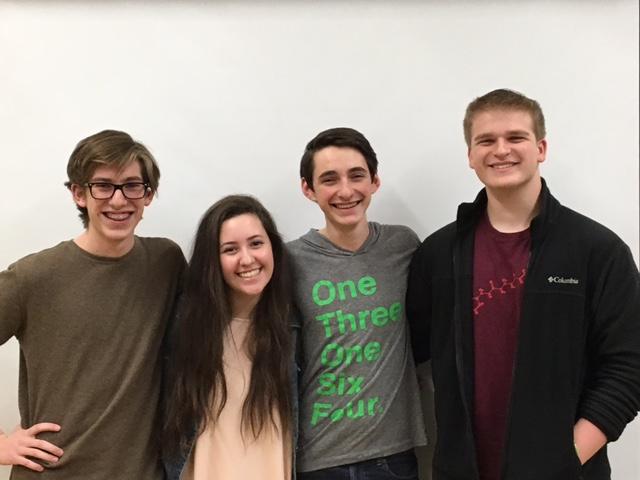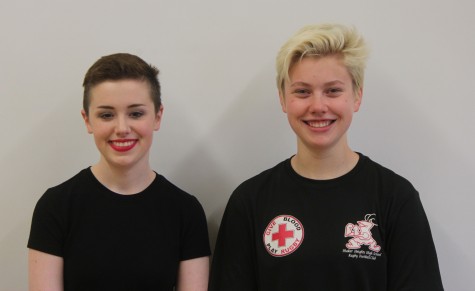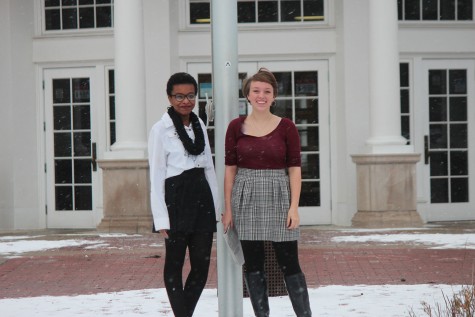From One Bubble to Another
In the second installment of Diversifying Diversity, The Shakerite interviews students who have transferred from small, Jewish day schools.
Sophie Browner, Asher and Lev Caruso and Evan Shaw all came to Shaker from small, Jewish day schools. Browner and Shaw attended The Joseph and Florence Mandel Jewish Day School in Beachwood, formerly known as The Agnon School, and the Caruso brothers attended Gross Schechter Day School in Cleveland.
Why did you come to Shaker?
Lev Caruso: “Shaker is a great public school. We moved to Shaker because of the public school, and also we like our neighborhood. So, my parents wanted me to go to this school and they really liked the IB Diploma Programme.”
Sophie Browner: “I was choosing between [Fuchs] Mizrachi, an Orthodox school — I’m not really Orthodox, but my dad wanted me to go — and I was also choosing between here, so I shadowed both schools and I liked Shaker a lot better. To begin with, my grade was, like, 17 kids who were all white . . . It was so not diverse, and I really kind of hated that by the end. I felt just really trapped and like I was just in a little bubble, and I felt like Shaker was a good place to get out of that.”
Asher Caruso: “Well, [my brother] was here. My parents really urged me to go here. I could have gone to [Fuchs] Mizrachi . . . I just felt like it wasn’t diverse enough and that there weren’t enough people for me to socialize with. It just wasn’t a great environment for me, and so I thought Shaker would be the best bet.”
Evan Shaw: “Both of my sisters, they also went to Agnon. One of them is four years older than me, so we moved from University Heights to Shaker when she was going to high school because [Shaker] is a really good school”
Do you actively practice Judaism?
Lev Caruso: “Yes … yes … it’s a weird question. How would you describe actively Jewish?”
Evan Shaw: “Jews are super confusing, because you don’t have to do things to be Jewish. For me, Judaism is about community and spirituality rather than religious obligation.”
Sophie Browner: “I don’t really know what I believe, even after going to a Jew school for all those years, and still don’t really know if, well, I have a strong connection with [Judaism], but not a strong belief in God or all that. I’m not really sure what I think …. I don’t really go to temple that much. I go, like, once a month.”
Has the way you practice Judaism changed since you’ve come to Shaker?
Lev Caruso: “I went to a conservative Jewish day school that was affiliated with the Conservative movement. I consider myself a Reform Jew, but, like, the Conservative background helped me learn a lot about Jewish history, and about the language and about Hebrew and a lot of that kind of stuff. The day school was a good basis for me in terms of leading the way to helping me to figure out what my spirituality is and how close I am to Judaism and figuring out whether I actually participate or not . . . So I would say that I’m actually more active in Judaism now, simply because I feel more connected to it having the background given to me.”
Sophie Browner: “At my old school, Agnon, we had T’fillah, which is praying time, basically, like, every day for 45 minutes or so . . . It was like a class. Basically we prayed, we got our Siddur, prayer books, so we did that every day. So we had two Jewish classes. We had Hebrew, and then we had Tanach, which was learning and studying the Torah, and Hebrew was just learning the language. So I definitely practiced it every single day when I went to school, and I went to temple, like, every weekend. I just don’t practice it as much [now].”
Evan Shaw: “For me, I wear my Kippah at all time. A lot of people see it, a lot of people ask me questions about it and think that’s really cool. And for a lot of people, I’m the most Jewish person they know. But it’s funny, because if you look at all the Jews on the really religious end and on the really secular end, I kind of consider myself just center . . . I just pick and choose different parts a lot of the time. It’s the cool part of being Jewish; there’s nothing you have to do. It’s different for each person.”
Asher Caruso: “I think also in Shechter it was kind of obligatory, like, it was just, ‘Do this!’ When you do it by yourself, it feels more like you’re connected to it. Like if I go to a USY [United Synagogue Youth, a Jewish youth program], a youth group event, I feel I’m being more Jewish than on a normal day. I don’t really practice Judaism as much as I did in Shechter. That was more like a grind every day. Now it’s kind of like something special that you can connect to, rather than having to do it like school.”
Did you encounter any issues regarding curriculum or credit transfer during the process of transferring?
Evan Shaw: “Ninth grade science here, which is like a semester of physics and a semester of chemistry, that’s what we did in eighth grade. Global Studies was also seventh and eighth grade curriculum . . . also, at Agnon, a lot of kids — not all kids but a lot — take geometry in eighth grade. So I came in and did Algebra II as freshman.”
Lev Caruso: “In terms of the general education credit, I found myself surprisingly prepared for public school . . . we learned a lot of the stuff in eighth grade that we learned in ninth grade . . . basically eighth grade at Shechter – well, I wasn’t here ninth grade – but eighth grade at Schechter and even tenth grade here was like a refresher on what eighth grade was. Middle school at the private day school definitely prepared me more than I think public school ever could. Which is really interesting, because it was also mixed with Jewish curriculum.”
Sophie Browner: “I take Hebrew out of school for language credit, at this place called Akiva, and so it’s like basically – I go twice a week, me and Evan both go . . . we get language credit for it. Mine is honors, and it’s really easy, because I get to keep refreshing my Hebrew, which I’m pretty good at, and I don’t have to take a language and I get an extra free period at school. So it’s pretty nice.”
Asher Caruso: “I take German now, I would’ve taken Hebrew if they had it, but now I think in Hebrew and German, and it’s really difficult because sometimes I don’t know words in German but I know them in Hebrew, so I replace the German words with Hebrew and Hebrew words with English.”
What are the positives and negatives of SHHS compared to your previous school?
Evan Shaw: “I think it’s really incomparable, because, like, I went to Agnon for 10 years. But then I went to Shaker — and this is my fourth year — and it’s for high school, and you can’t really compare high school to middle school. They’re just different. I really appreciate that I got that Jewish education, and I really appreciate that I’m at a — real school.”
Asher Caruso: “Yeah, like, I have a lot of friends at Mizrachi, and they keep talking about how it’s just a bubble around them, and you can’t really be your own person, and you can’t really expand your [horizons] that much. I’m really appreciative of that.”
Evan: “A couple of weeks ago — I take AP Comp — and [Natalie] Sekicky asked us if we noticed bullying in the school, and everyone said no. And like, I’m sure it exists, but what I said — and I mean it in the nicest way — is that there are just enough weird people here that, like, everyone who is weird in their own little way can just find someone. And in a grade of 26 people, everyone knows who you are, you’ve known each other for 10 years . . . And on the other hand I’m very glad for it. I’m still very close with a lot of these kids. I see, like, seven of them, which out of 26 is a lot, regularly, and I’m close with them. But, like, here, it’s just an opportunity to change. It was a welcome change.”
Sophie Browner: “I think there are more pros than cons of Shaker versus Agnon. Because Agnon, even though it was a very friendly and comforting environment, it almost felt like we were being protected, and it’s nice to feel like we’re out and can do what we want for ourselves.”
Evan Shaw: “Everyone says there’s like Shaker’s ‘bubble.’ And we’re coming from Agnon’s ‘bubble,’ or the Schechter ‘bubble.’ But they’re all bubbles! They’re just different bubbles.”
Lev Caruso: “I think that’s kind of cool, though. I think that was the real transition between middle school and high school. Because, like, the real world can be scary, so I think it’s good to have the middle school and elementary school to prepare for that, and then, like, you can, once you’re ready to be your own person, you can, like, go out and do your thing.”
Evan Shaw: “I agree conceptually, but, like, something people always ask me is, ‘Oh, was it so hard to transfer to such a big school?’ And, like, no. ‘There’s so many people!’ And the thing I’ve always told people is that, you know, you walk the same way to your classes every day, and you see the same people every day in the halls, so you kind of create your own little school of faces. It’s like the same couple hundred people. So you from a small school to a big school, but it’s not huge and it’s not overwhelming.”
Asher Caruso: “I get overwhelmed by people all the time, and so, like, this school was giant for me. I’m still finding halls that I never knew. Like, the Chamber of Secrets [from Harry Potter]. I go down a hallway, and I’m like, ‘Where’s a bathroom?’ and it’s like, ‘To your left!’ And I’m like, ‘That wasn’t there yesterday!’ ”
Evan: “It seems like everyone knows each other, and we don’t know them. Like, ‘You went to Mercer? I went there!’”
Sophie: “I’m like, ‘What’s Mercer?’ I did not get the whole middle school/elementary school situation. I’m like, there’s Onaway, and there’s Woodbury?”
Evan: “I still don’t understand why you need so many lower schools. Like, you can fit 400 kids into one building. I guess it’s just there aren’t that many Jews, and there are secular Jews, and there are a lot of Jewish schools. It is kind of weird, though, that you have, like, five lower schools. Even though it wasn’t an overwhelming switch, it’s just interesting to throw it all into perspective.”
Do you find other students and members of the Shaker community inclusive or ignorant when it comes to aspects of Judaism?
Asher Caruso: “Well, I mean, I always got ‘the Jew questions.’ There’s that one guy who’s all like, ‘Believe in God or not,’ and then I have to argue with them for a bit and it’s kind of weird. But generally, it’s been super accepting. I’ve been kind of blown away by it. I’ve been used to a lot of questions like that, so I know how to answer them, but a lot of people were like, ‘Yo, this is my group of friends; you’re their friend now.’ And like that hasn’t happened to me before, ever.”
Evan Shaw: “I get questions pretty often about Judaism, and like, they’re usually good questions. Someone’s like, “I don’t want to sound ignorant…” But no! I would always rather someone ask a question than just hold their assumptions. And, it also, you know, depending on who asks the question, my answer may change. But yeah. People are accepting, people are nice, people are cool.”
Lev Caruso: “I think there’s a difference between not knowing something about Judaism, and not being accepting. Like, I get a lot of questions about Judaism that, somebody with a background in Judaism would be like, ‘Why would you ask that?’ But, like, it’s a legitimate question, and if they’re phrased in the right way, it’s not bad at all. But I wouldn’t think that anybody’s ignorant, you know?”
Do you find that your Shaker experience is affected by your faith?
Evan Shaw: “Oh, yes. Without a doubt. Like, Rosh Hashana, where everyone takes the first day off. It’s a two-day holiday. I take the second day off, I go to temple. I also do Jewish youth group, and I miss so many days for conventions and events. I think I got, like, 11 absences first semester, and like seven of those were from youth group conventions. So, yeah, it affects it. Not negatively; everyone’s super accommodating, and if I have to take a test early, or I need to take a test late, it’s not problem. I talk to them.”
Lev Caruso: “It is an extra hoop to jump through, though. Especially coming from a Jewish day school. The calendar, is like, we get both days of Rosh Hashana off, and we get random Jewish holidays off, we get Tzom Gedalia [a minor Jewish holiday] off.”
Evan Shaw: “And our spring breaks always correlated with Passover. And now, sometimes they do, and that’s convenient — like, we don’t have to bring Matzoh to school — but sometimes they don’t. And that’s like, whatever. That’s just life.”
Is Shaker doing anything that aids in making the school environment more accepting?
Sophie Browner: “I definitely think it’s the people more than anything. I was so, so nervous on the first day of school last year. I’ve never been so nervous in my life. But people came up to me who I’d never seen before, like ‘Hey, I’ve never seen you before, who are you, where’d you come from?’ in a nice way. And it was nice, and I felt like people actually wanted to get to know me, which was really nice.”
Lev Caruso: “I don’t know if anybody’s less or more accepting, I think it just comes from different backgrounds, and everyone’s pretty accommodating to whatever it is. Nobody’s going to be like, ‘Oh, I don’t understand. Why can’t you come to this thing?’ A teacher’s not going to make us turn in an assignment on Yom Kippur.”
Asher Caruso: “I think it’s just like, raising the kids right. They’re pretty diverse, and I think that helps them.”
Evan Shaw: “But it’s not just Jews. It’s also just like, we have Good Friday off . . . and we’ve got other days off. We’re on break for Christmas, and if we weren’t, we’d have Christmas off. The school’s accommodating for everyone, and I think that’s pretty cool.”
What could Shaker do to make your experience better?
Evan Shaw: “As a Jew or as a student?”
Sophie Browner: “At our old school, on Fridays — I know this is super unrealistic — we got out of school at 2:30 for Shabbat, which was super nice.”
Lev Caruso: “I think they’re doing the best that they can, honestly. Like they give us days off for some holidays, I think it’s good . . . and it would be the same if it were another religion. Somebody who takes their religion that seriously, it’s going to be the same.”
Evan Shaw: “Jewish holidays, most of them start at sundown, so in the winter, and time changes, we [went] home an hour early, because if you get out of school at 3:30, it’s dark by the time you get home. Like, aha, Shabbat has started! For a lot of people it wasn’t an issue, but it was a very nice sentiment.”
Do you have anything else you’d like to say?
Sophie Browner: “I would just like to say thank you to all classmates out there . . . who have just been so nice to me, and helped me feel like I’m part of the Shaker family, even though I’m new.”
Lev Caruso: “If somebody has a question about Judaism, or wants to know more, anything like that, any of us are totally free. Hit us up with any questions. I like getting questions about Judaism, because then I can teach people something.”



